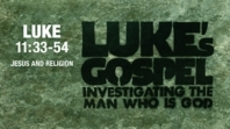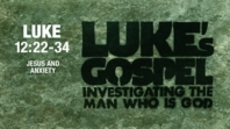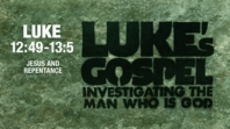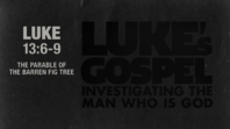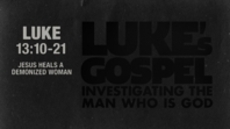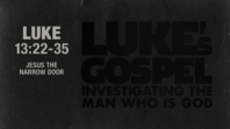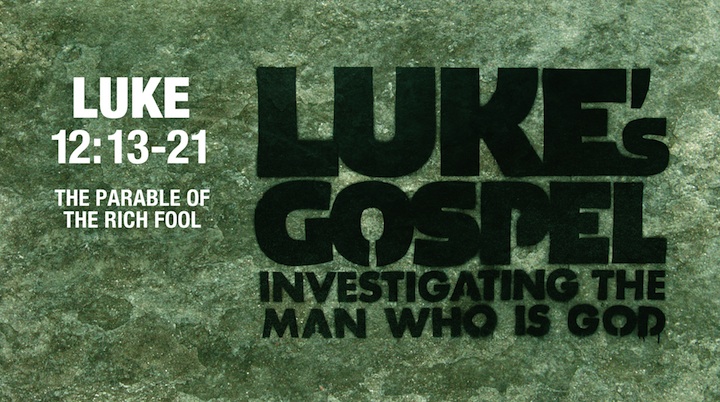
Can’t see the video? Download and install Flash to be able to view. Get Flash Here
When it comes to wealth, Jesus looks at the heart—there are righteous and unrighteous rich, and righteous and unrighteous poor. In this parable, Jesus describes an unrighteous rich man, whom he calls a fool. The rich fool’s sin was not that he became wealthy, but that he worshiped his wealth instead of worshiping God with his wealth. If you aren’t content, you’ll covet, which is idol worship. You don’t need more wealth; you need more wisdom. Will you be foolish or faithful with what God gives you? Will you be rich toward God and others, or only think of yourself?
13 Someone in the crowd said to him, “Teacher, tell my brother to divide the inheritance with me.” 14 But he said to him, “Man, who made me a judge or arbitrator over you?” 15 And he said to them, “Take care, and be on your guard against all covetousness, for one's life does not consist in the abundance of his possessions.” 16 And he told them a parable, saying, “The land of a rich man produced plentifully, 17 and he thought to himself, ‘What shall I do, for I have nowhere to store my crops?’ 18 And he said, ‘I will do this: I will tear down my barns and build larger ones, and there I will store all my grain and my goods. 19 And I will say to my soul, Soul, you have ample goods laid up for many years; relax, eat, drink, be merry.’ 20 But God said to him, ‘Fool! This night your soul is required of you, and the things you have prepared, whose will they be?’ 21 So is the one who lays up treasure for himself and is not rich toward God.”
The Holy Bible, English Standard Version copyright © 2001 by Crossway Bibles, a publishing ministry of Good News Publishers. Used by permission. All rights reserved. Quotation information.
Luke 12:13–21
13 Someone in the crowd said to him, “Teacher, tell my brother to divide the inheritance with me.” 14 But he said to him, “Man, who made me a judge or arbitrator over you?” 15 And he said to them, “Take care, and be on your guard against all covetousness, for one’s life does not consist in the abundance of his possessions.” 16 And he told them a parable, saying, “The land of a rich man produced plentifully, 17 and he thought to himself, ‘What shall I do, for I have nowhere to store my crops?’ 18 And he said, ‘I will do this: I will tear down my barns and build larger ones, and there I will store all my grain and my goods. 19 And I will say to my soul, Soul, you have ample goods laid up for many years; relax, eat, drink, be merry.’ 20 But God said to him, ‘Fool! This night your soul is required of you, and the things you have prepared, whose will they be?’ 21 So is the one who lays up treasure for himself and is not rich toward God.”
Well, howdy Mars Hill. We today start a three-week series in Luke 12, where Jesus deals with the issues of money and wealth and possessions and worship. And so I brought along my good friend Pastor Jamie Munson, who runs everything administratively and organizationally here at Mars Hill, to share with you a resource that he’s put together and a free gift that he’s given to you and how this’ll work through your community groups and help set up what we like to finish every year with, that is something called the Generous Campaign, so—
That’s good. Thank you, Pastor Mark. You all got this book on your way in? Yeah? Good, good. I’m really excited to roll this out. It’s been a collection of thoughts over the years as I’ve studied the concept of money, looked at it biblically, looked at it practically. I wanted to get you a tool that helps define what Scripture says, how we’re to treat our money, how we’re to spend it, how we’re to earn it, how we’re to live on mission with it. But I also wanted it to be practical, as money is such a practical topic that we deal with on a daily basis. And so this is yours. We’re going to be going through this the next couple weeks as Pastor Mark said.
The big idea is that money can either be your god or you can use it to worship your God. For me, money was my god. I got my first credit card at the age of eighteen. I got my credit card and it took me exactly one hour to max it out completely. One hour. Turned eighteen, got it in the mail, called up, I activated. Within an hour, I was at the stereo store getting a ten-disc CD changer put in my truck. The stereo was probably worth more than the truck at that time. Had it, a week later it gets stolen. I was so bummed. I was depressed. I lost my stereo. And then about a month later, the bill actually comes in the mail and I was floored. I didn’t know what this was. My family called them free money cards. That was what I thought it was. You just give this cute little plastic card to a person and you get your goods in return and that was it. It was magical. I was so stoked. And then I get the bill and I’m bummed that I’m paying off some stereo that some thug has who has stolen it out of my car. Totally bummed.
But I met Jesus at the age of nineteen and God changed my heart. My money was no longer god, but it was him, and so I started to learn and study and grow. How do we use the resources that he has given us? How do we use them to worship him, to love him, to serve other people, and to be a part of the church and be on mission? So that’s the big idea of the book. Real excited for you to go through it. A couple weeks, again, as we study through Luke 12, in God’s providence the timing was perfect with these sermons to roll it out. And I’m really hoping it’s a good resource for us as a church and all of us can be on mission with our money.
So grab some, go through it with your community group, go through it with your friends, your family. We’ll have them available at some point on Amazon.com. You can get them and order them for people that aren’t in the area. But do take a bunch, give them away. We’re excited to give that as a gift. Actually, it was paid for by a number of members in the church. So a generous gift by a bunch of members that wanted to bless you all. I’m not taking any profit or royalties or any income from the book. It’s all just a gift. So I hope you enjoy it. I hope it’s helpful for you. I hope it draws you closer to Jesus.
A couple other things I wanted to hit, part of my job at Mars Hill is to make sure all of our money, all of our resources that we have collectively as a church, that we’re stewarding them as effectively as possible, that we’re getting the most return on our investment in terms of gospel fruit, people meeting Jesus, our mission of making disciples and planting churches is going forward.
A couple of things in how that works at Mars Hill. We have nine campuses, but we have one family budget. That means all of us are giving and we’re sharing a lot of resources across all of our campus. One of those is Pastor Mark’s preaching, technology, a lot of our back-end services, things that we don’t want the campuses to have to repeat because it’s just a waste of money and time. We want them to focus on their mission, and so we share a lot of these resources across the church. But then each campus is also self-sufficient. We want them to meet their own needs, pay their own bills. That includes their facilities, their programs, their staff, the mission locally that God’s called them to. So it’s this beautiful thing that we get to share the resources as one big church but then each campus also has its local mission. How it works is about 50 percent of the budget goes to the global things and 50 percent of it goes to the local campuses. It’s a good partnership as we’re in this together, trying to see as many people meet Jesus as possible.
A couple of other things. We have a couple professional CPA’s on staff, a couple of MBA’s on staff. We want to have a very competent financial staff so that all of our money is spent well and we have good professionals looking at it. In addition, we have two outside CPA firms that do reviews and audits of our books. So every year we submit ourselves to an annual audit where an outside firm comes in and looks at how we’re spending our money, what we’re doing with it. Is there fraud? Is there abuse? Is there any of those systems? And up until this point, I’m happy to report that every time we’ve done that we’ve had a perfect mark with it. And so God’s been gracious to us.
And we’re trying to do as much as we can to steward the resources wisely. Included in that is we put together an annual report. If you’ve been around for a few years you’ve seen this. We try and give away as much financial information as possible because we have nothing to hide. Again, we’re not perfect as a church, but we want to walk above reproach and give you a snapshot into how we’re stewarding those resources. That’ll be out in January.
As you know, 2010, 2009, we’ve been in the middle of this economic recession, as people are calling it. We’ve scaled back significantly as a church. We wanted to be really wise and not live outside of our means, but live within our means. That includes laying off a bunch of staff over this last year, tough cuts that we’ve had to make so that we’re appropriate, we’re wise with the money, and not stretching ourselves and not running ourselves into debt. A bunch of the senior leaders as well have foregone raises over the last couple of years. We just want to do as much as we can to, again, steward the resources wisely and not get out ahead of where God is at and the resources we have, which means we head into the end of the year and we’re teeing up our Generous Campaign. We need to finish the year strong. There are a ton of opportunities that God has given us to plant campuses. Mark’s going to talk about that vision a little bit later in the sermon. Lots of things. Lots of opportunities that God has given us to preach the gospel and see people meet Jesus.
So as you go into the year-end, we ask you to continue to give regularly, give faithfully, and then consider how to give a gift above and beyond so that we can reach a goal. Our hope would be to see a million dollars over our normal budget come in in the end of this year, so as we plan to launch campuses in different areas, as we plan to shore up some ministries, we could do so in such a way that opens the door for more people to meet Jesus. So that’s what we’re about, that’s what our money’s about, that’s what the book is about. I do hope it’s helpful for you. Excited to roll it out there. Send us feedback, be in prayer, discuss it in your community groups, and that’s it.
Cool. Thank you, buddy. Love you man, I appreciate you. My good friend, Pastor Jamie. [Applauding] We’re just going through Luke’s gospel, and in the providence of God, Jesus is talking about money as we look at the parable of the rich fool in Luke 12:13–21, so open your Bible or your app and we’ll study it together. I’ll pray.
Father God, I do thank you that you speak in the Scriptures about the practical stuff of life like money, wealth, and possessions. And God, we sometimes gravitate toward subjects that we find most interesting, most fascinating, but God, you continually bring us back to certain issues that perhaps we don’t want to look at but those are the ones we need to look at most fervently. So help me to teach well. Help us to learn well. And Lord Jesus, it is our prayer by the power of the Holy Spirit that we would worship you with our wealth and that we would not worship our wealth. Amen.
In the three-week miniseries here in the middle of Luke, we’re going to look at Jesus’ teaching about money. And some of you may ask, “Why now?” Well, first of all, not everyone is struggling financially. Some people are doing well. Secondly, some people are struggling, but it’s because of foolishness. And perhaps what you don’t need is more wealth. Instead, you need more wisdom. If it was foolishness that aided you in your debt, your struggles, your poverty, just getting more money without more wisdom won’t cure your problem because you’ll continue the same errors. And so it’s a good time while we’re humble, it’s a good time while we’re in a recession, it’s a good time when many are struggling to gain wisdom and how to learn to live humbly, contentedly, within our means, so that if and when there is an economic turnaround we don’t conduct ourselves the way we did in the years preceding the pain point that we find ourselves in.
And so when I talk about money and wealth, I’m doing so in an aggregate and collective way. I’m talking about your credit cards, your debit cards. I’m talking about your cash. I’m talking about your job, your income, your inheritance, your housing, your vehicle, all of your stuff. Your collective wealth is what I’m referring to.
And this is a big mega theme of the Bible, this issue of wealth and possessions. The Old and New Testament combined have about eight hundred passages on wealth. This includes saving, spending, investing, tithing, running a business, running a family budget. Jesus speaks of wealth a lot as well. About 25 percent of the time, he is teaching about money, wealth, and possessions. That includes this section of Luke.
And as we examine the Bible, we see that the Bible treats wealth and possessions differently than our culture does, in a couple of ways. Number one, the Bible is going to deal with our heart and our spending and our motives, whereas in the culture it tends to be less about personal accountability and more about shifting of blame.
So right now we’re in an economic downturn, and if you listen to the chatter and banter in the culture, the rich will blame the poor, the poor will blame the rich. The rich will say, “Well, the poor are killing us because they’re all fat and obese and they all want free health care and they’re just taking all of our money so we can’t run our businesses.” And the poor will say, “Well, you rich, you rip us off. It’s corporate fraud and greed.” They say the problem is the rich and the poor. And every election year we also get the added bonus of the fact that the problem is either the Democrats or the Republicans. And sometimes we all come together and say, “No, it’s the terrorists.” That’s how we all unify, “It’s the terrorists. That’s why we’re having economic troubles. It’s the terrorists.”
Well, as far I can tell, it’s the responsibility of the rich and the poor and the Republicans and the Democrats and the Americans and the terrorists. That’s the problem. Pretty much everybody. And the Bible brings us to look at ourselves, not just blame everyone else, but look at our own sin and folly and rebellion in regards to finances and wealth.
Additionally, what happens then when the issue is reduced to riches and poverty, we end up with prosperity theology and poverty theology. Prosperity theology will take a few verses from the Bible and say, “If you love God you should be rich.” And poverty theology will take other verses from the Bible and say, “If you love God you should be poor.” And then there’s even a fighting over whether or not God wants us to be rich or poor. That is thinking in a way that is worldly, not in a way that is wise.
The Bible actually gives us four categories in regards to riches, wealth, and possessions. We’ll investigate each of them over the course of these three weeks. This week we will look at the righteous and unrighteous rich. And here are actually the four categories in your Bible when it comes to wealth.
There are the righteous rich, meaning the way they obtain their wealth is righteous. They work hard. They invest smart. God blesses them and things go well. Additionally, what they do with their riches is righteous. They give to God. They give to the poor. They take care of their family. They pay their bills. If you run a company, this is taking good care of your employees. You can be righteous and rich.
Additionally, you can be unrighteous and rich. You can get your money in a way that is very dishonoring to God. Ripping people off, being crooked, conducting yourself in unacceptable business practices, and/or getting your money and then hoarding it, keeping it all to yourself, spending it frivolously, not giving to God, not helping the poor, being very, very, very selfish. Who we will examine today is a man who is a called a rich fool and he would fit under the category of the unrighteous and rich.
Number three, there are also people who are both righteous and poor. The way they get their money is through honest means, but they don’t have very much. They’re just poor. They’re just poor. And the way they steward their resources is righteous. They give to God. They give to others in need. They pay their bills. They’re generous with their family. They don’t have much, but what they do have they tend to be very gracious and godly with. There’s going to be a woman in the Bible who’s a widow and she doesn’t have much, but she gives very generously to the cause of the gospel. Well, Jesus says that she’s an exceedingly righteous woman in the way she conducts herself.
Additionally, there are people who are unrighteous and poor. They don’t work hard. They don’t work smart. They don’t invest. They don’t save. They don’t have retirement. They don’t have life insurance. They’re not really thinking about it. They’re just kind of frivolous and they don’t conduct themselves very well. And if and when they do get money, they don’t really change insofar as wisdom is concerned. They just use it to pay off their credit card debt and then go right back to the way they were living before. And they’re in a cycle of folly.
And what can happen is if you only think in worldly categories and not theological categories, you could think in terms of rich and poor and it’s not that easy, because there are poor people who are unrighteous. There are poor people who are unrighteous. Proverbs talks a lot about people who don’t work, who chase fantasies, who try “get rich quick” schemes. This would be the person who doesn’t work very much or goes to the casino or blows it or spends it haphazardly and frivolously. This would be the guy on the side of the road that I saw recently. He had a sign, he said, “I’m not going to lie to you. I just want money for beer.” You can’t say, “Oh, he’s poor, just like Jesus.” He’s not poor just like Jesus.
Jesus was righteous and poor. Jesus was righteous and rich. Did you know that? It’s not whether you’re rich or poor. It’s whether you’re righteous or unrighteous and Jesus was both rich and poor. In heaven, was he rich or poor? Rich. Heaven’s a nice neighborhood. Right? It’s really nice. And it says in Corinthians that though he was rich, for our sake he came to the earth and became poor. So you can be righteous and rich. Jesus was and is. You can be righteous and poor. On the earth, Jesus was. The issue is not are you rich or poor. The issue is, are you righteous or unrighteous in how you obtain and steward the resources that God has entrusted to you.
That being said, Jesus is now going to talk to us about our riches. And the first question he has for us, in Luke 12, is this: Are we coveting or content? That’s the first question. Are we coveting or content? He says it this way, Luke 12:13–15, “Someone in the crowd said to him, ‘Teacher, tell my brother to divide the inheritance with me.’ But he said to him, ‘Man, who made me a judge or arbitrator over you?’ And he said to them, ‘Take care, and be on your guard against all covetousness, for one’s life does not consist in the abundance of his possessions.’”
Now, we looked in last week’s sermon that the context is that thousands of people are coming out to hear Jesus preach. He’s essentially quickly assembled a megachurch. And it says that people are trampling over one another to hear him preach and teach. And apparently one man has gotten near the front and he’s got access to Jesus and Jesus just finished teaching about hell, saying scary things like, “Don’t fear those who can just kill the body. Fear those who can kill the body and throw it into hell.” That’s scary.
And this guy raises his hand and apparently says, “Yeah, that whole hell thing, that was cute. Here’s what I’d like to talk about, Jesus. I have something more important. How do I get more money?” This guy has one shot to talk to Jesus. And what does he pick? Money. And how many of us have that same proclivity? What’s on the front of our mind is finances, wealth, possessions. That’s what we’re thinking about most of the time. That’s what we’re talking about to God a lot of the time.
And what Jesus says is this, basically, “I don’t care. It matters far more to you than it does to me.” Some of you would be very hurt to hear that. “Are you telling me that Jesus doesn’t care about my wealth?” Well, he does care, but he cares more about your relationship with him. He cares more about your eternal destiny. And sometimes what happens when you come to church or community group, you only care about what you care about and you miss everything that’s being taught or discussed because you are obsessed with one issue that God doesn’t care about, at that time, nearly as much as you. And that’s this man’s situation.
And what happens is this. He is consumed with coveting. Apparently, perhaps, his father has died and now they’re splitting up the family inheritance. And he’s worried that his brother’s going to get more than him. How many of you have seen coveting destroy a family? How many of you have seen coveting destroy a family when someone dies? All of a sudden what looks like a functional family, someone dies, and there’s an inheritance. There’s possessions, wealth, life insurance, and now everyone in the family is jockeying, arguing, seeking to get what they want. And it becomes adversarial and contentious. This is where the heart is exposed. This is where brothers should be grieving together, mourning together. They should be lamenting the loss of their father. They should be working things out. Instead, they’re basically looking for attorneys and they’re going to make this litigious and contentious.
How many of you have seen this in your own family? It’s horrifying. It’s embarrassing. We had a situation not unlike this many years ago in my own family when I was a teenage boy and it made an indelible mark on me. Like, “Why are we fighting over the possessions? Why has this gotten so adversarial and acrimonious? Oh, there’s coveting.” There’s coveting. And the heart is exposed in moments of opportunity.
And so Jesus says, “Guard against all covetousness.” What is coveting? Coveting is not just the having of possessions. It is the loving of possessions, which results in the hoarding of possessions. Loving meaning you can’t stop thinking about it. You can’t live without it. You absolutely have to have it. And even if you don’t have the money, you’re still going to go get it. We call that debt. The average American has over $7,000 on a credit card right now. The most likely person to be in credit card debt is a young, single woman, apparently out buying clothes to look nice to attract a man who likes to pay off credit card debt. That’s kind of the—that’s the shell game. And what happens is then if you’re coveting something, you’re lusting for something, you have to have something, you put your hands through the shackles to buy it and now you are indebted to the credit company because the borrower is slave to the lender. That’s the trick of coveting. Coveting ends in slavery. Someone owns your dollars, someone owns your days because you worship someone or something other than God.
So coveting is a horrendous sin, but we don’t believe this. We do not believe this because we call it advertising. We don’t use the word coveting. We use the word advertising or PR or marketing. The whole point of advertising is to get you to covet, to get you to be discontented because you either have contentment or covetousness. If you’re content, you’re glad for what you have. If somebody else has something, you’re glad for them, but you don’t have to have it. You’re not jealous about it. You’re not obsessing over it. You’re not going into debt to keep up with them. You’re okay with it. But if you’re coveting, everything changes.
Advertising exists to create in you a sense of discontentedness. Things you didn’t even know you needed. And the truth is you don’t really need them. Have you just watched a car commercial lately? “Oh, it’s a new car. I have an old car. My car does not have all of those speakers. Those are amazing. Oh! Heated seats. I—oh. My bum is cold. I don’t have heated seats. I need heated seats.” All of a sudden you’re discontented. “I need heated seats. I need one for my bum and one to warm a muffin on the way to work for my breakfast. That’s what I need, heated seats.”
All of a sudden you start coveting things that you didn’t even know existed. And so what you do is you lust and you covet and you obsess and then you go into debt and you go get it and then six months, twelve months later you know what they do? They come out with a new improved version. This is technology. This is transportation. This is fashion. Everything keeps changing so that you remain without contentment and you’re filled with covetousness. Coveting, coveting, coveting.
See, Americans don’t see coveting as a sin, but it is. It’s actually one of the Ten Commandments. God wrote a list, Ten Commandments. Number ten, no coveting. It actually made the list. Here’s how he says it, God does, in Exodus 20:17, the tenth commandment, “You shall not covet your neighbor’s house, or covet your neighbor’s wife, or his servant, his male servant, his female servant, his ox.” All right, that would be his tools, his truck. “His donkey,” that would be his car, his Jeep, “or anything that is your neighbor’s,” including his TV, the huge one you can see when you’re walking your dog and you look through the window and you see the big TV and you stop to covet. “Oh, look at that TV. That’s so big I can see it from the street. I need me one of those TVs.” The whole point of the mall is window coveting. Why do you think they put all the stores together? So when it’s raining you can walk around and go, “I need that. I need that. I need two of those. I don’t even know what that is. I better go in and find out just in case I need it too.” The whole point is coveting and discontentedness.
And covetousness, here we see, it is an attitude of the heart that consumes everything. You’re not just content in one area and coveting in another. You’re either content in all areas or coveting in all areas. And it can be your neighbor’s house, their spouse, it can be all of it. And I think it’s interesting that he starts with coveting your neighbor’s house. How many of you covet your neighbor’s house? Condo, dorm, apartment, whatever. Their dwelling you want. “They have more square footage than me. This is very frustrating.”
How many of you watch those shows on TV and you start coveting? You watch MTV Cribs or a show like that? Like, “Oh my gosh, they have a basketball court in their bathroom. I need a basketball court in my bathroom. Now, I used to be happy with my bathroom. But now it seems so small.” You just start coveting over their house. “Oh, they have a theater room. They have a game room. They have a poker room. Oh man.” Or we watch those shows that are home improvement shows. Add a wing to your house, upgrade your bathroom, fix your kitchen, do it yourself. But it’s coveting. It’s, “Oh my gosh, they have granite countertops. We don’t have granite countertops. I’m sure when Jesus rose from death he didn’t mean for us to have non-granite countertops. That couldn’t be what the Lord had in mind.” All of a sudden you’re coveting. This is why if a house goes for sale in your neighborhood, the first people to go in for the open house are all the neighbors. All a bunch of coveters walking around, trying to figure out, “Well, do they have more square footage? Is their house nicer than ours? How do we stack up?” It’s coveting. It’s coveting. It’s the American way.
Jesus says guard your heart against coveting. It’s a real problem. And the way you guard your heart against coveting is you worship God. Because, see, coveting is the worship of an idol. An idol can be some created thing that you love too much or you long for too much or you lust after too much. And so the way we combat coveting is through worshiping. That’s why the first two of the Ten Commandments are number one, there’s only one God. Number two, you worship him alone. And if you worship God alone, you won’t break the rest of the commandments, Martin Luther says. You won’t murder somebody. You won’t commit adultery. You won’t lie and you won’t steal and you won’t covet. Because if you’re worshiping God, you’ll be content with your spouse. You’ll be content with your house. You’ll be content with all that God has given you and you won’t be coveting. You won’t be sinning. You’ll be worshiping. Do you believe that? Most of us don’t.
Here’s how it is declared in Colossians 3:5, “Greed is idolatry.” Is that clear? Greed is idolatry. And see, a lot of people right now, they’ve not dealt with a greed problem. That’s why they’re grieving. See, we worship as a collective people, the god mammon. Jesus calls money “mammon”, a false god. We worship mammon. Now mammon has died. And people are grieving, “Our god died. I lost my equity, my retirement’s down. My portfolio is not as good as it used to be. I’m getting ready to graduate and I can’t make as much money as I would have five years ago. I can’t even find a job that is what I was hoping for. Argh! I’m so grieved! My god has died!” And everyone is secretly waiting for a resurrection. “When will our god be back? When will our god be back? Are home prices on the rise? Is unemployment down? Is our god stirring yet?” Greed is idolatry. You don’t need more wealth. You need more wisdom. You don’t need your idol to come back from death. You need God to be the object of your affections.
Now in saying this, I want to delineate two things. Tim Keller is very wonderfully gifted as a Bible teacher and he’s been a friend to us for many years, and he distinguishes between a surface idol and a deep idol. When it comes to issues of money, I think this is helpful. So for some, if not all, the surface idol is wealth, status, possessions, riches. But sometimes there’s a deeper idol under it.
I’ll give you some examples. For some people, the surface idol, the one we see is riches. But the deep idol is status. What they really care about is an identity not rooted in the grace of God through the person and work of Jesus, but I’m defined by the car I drive. I’m defined by the neighborhood I live in. I’m defined by whose name is on my underwear. That determines my status. That gives me access to certain social groups and that puts me in a certain class. So the deep idol can be status.
For others, the deep idol is security. Have you ever read a story about a miser who collected a massive fortune? Wore old clothes and drove a beater car and lived in a simple house and never spent any of it. And then died to leave a massive fortune. You ever wondered what motivates those people? The surface idol is wealth, but the deep idol is security. They’re not trusting God to take care of them. They are thinking, “If I have enough money stowed and stashed away, whatever happens I’ll be okay because I can pay for a doctor bill, I can pay for a surgery, I can cover my needs.” So they don’t spend any money because their idol is security.
For some it’s comfort. The surface idol is, “Why did you buy that? Why are you in debt? Why are you spending all this money? Why are you getting all these toys? Why do you have so many hobbies?” It’s comfort, ease, pleasure. That’s the deep idol. “I just want to be happy. I want to have junk. I want to have stuff.”
Now the question is are you content? If you’re not content, you’ll be coveting. And so Jesus says to be on guard against covetousness.
Number two, then, he goes on to ask us whether or not we will be foolish or faithful when it comes to our finances. Luke 12:16–20, “And he told them a parable.” This is an illustrative saying. “‘The land of a rich man produced plentifully, and he thought to himself, “What shall I do, for I have nowhere to store my crops?” And he said, “I will do this: I will tear down my barns and build larger ones, and there I will store all my grain and my goods. And I will say to my soul, Soul, you have ample goods laid up for many years; relax, eat, drink, be merry.” But God said to him, “Fool!” Idiot! “‘“This night your soul is required of you, and the things you have prepared, whose will they be?”’”
Well, what happened to this man? He obtained great wealth. He did so, apparently, in a way that is not sinful. He had a business and his business flourished. Is it a sin to have a business that flourishes, yes or no? It’s not a sin to have a business that flourishes. Many of you should pursue a business that flourishes. You should try to make money. If you’re good at it, do it. So his sin was not becoming wealthy. The sin was that he didn’t worship God with his wealth, he worshiped his wealth. He was foolish.
So what does he do? He realizes, “I have more grain,” which in that day is how you would trade commercially, an agrarian society, and he’s got a barn to put it in, but he doesn’t even have room in his barn. All right? It’s overflowing. He has way more than he needs, right? He’s got his bills paid. He’s got his retirement account knocked out. He’s got his life insurance covered. He’s got all of his requirements for faithful stewardship covered, and beyond that he’s got a ton of loot. He’s doing fine.
And what he does is he decides, “I’m going to build more barns to hold more grain and more goods,” meaning all my money and all my possessions. What does God call him? A fool. This is the only express text in the Bible that deals with the issue of retirement. And it doesn’t do so very positively. “You fool.” Does that mean everyone who retires is a fool? No. But the driving motivation of retirement leads to a lot of trouble and it led to a lot of trouble in the last decade in this nation, where people are getting into high-risk loans and homes and flipping and trying to get rich and trying to retire.
And the whole goal is, “I don’t want to work for the rest of my life.” If you do that, you’ll fall into all kinds of trouble. It’s a trap. It’s a trap. And everybody thinks they’ll be the exception to the rule and we’ve now learned that’s not true. We’ve learned it painfully. Our goal is not to retire because even if you retire from work, you don’t retire from Christ. Okay, it’s not a sin if you make enough money that someday you don’t have to get up and go to work every day. But that doesn’t mean that your whole goal is to just eat and drink and play shuffleboard and wear flip-flops and live somewhere where the sun shines and you hang out with a bunch of other people who wear, you know, therapeutic cream for their aching joints and talk about their most recent surgery while sipping drinks with umbrellas in them, right? That’s not the goal of life.
The American dream, he says, is foolish. And this is this perennial crisis we’re having in the church where Christians just want to retire and go to somewhere sunny. They don’t want to invest in their kids, their grandkids, their church. They don’t want to lead a community group. They don’t want to teach or train anyone in anything. The whole point is, “I just want to sit around and pretend like I’m in heaven already, find an idyllic, perfect place where the sun always shines, and pay somebody to rub my back.” And Jesus says, “That’s a dumb idea.” That’s a dumb idea.
Now, you’re not as happy as you should be. This is a fantastic sermon, okay? You should be happier. Let me see if I can help you get a little bit happier.
Now what this guy decides is, “I need a bigger barn.” We just did this. Americans, we just did this. We had years where there was a lot of grain and everybody went out and got a bigger barn, a house, to hold all their junk. Now we can’t afford our barn. I’ll show this to you in hopes that it is helpful. This is a house in South Africa. A house. It’s in a township where there are a few hundred thousand people. If you saw District 9, that was actually pretty accurate. This is actually a really nice house because not only does it have tin siding on the top, it has tin siding on the walls. It’s a couple hundred square feet. As I said, in this township maybe 300,000 people live, there’s one not too far away where a million people live. It’s one room. The family will roll out a mat and sleep on it at night and roll the mat up in the morning. There is no toilet indoors because there’s no plumbing. There’s no central heating. There’s no central electricity. It’s stacked cinderblocks, dirt floor, tin roof, a couple hundred square feet. Most of our neighborhoods would not allow us to put our lawn mower in one of these because it wouldn’t meet code for our backyard. I saw the same thing when I went to Haiti.
Here’s my point. When we hear the story about the rich fool, what invariably happens is we think, “Yes, rich people, we don’t like them.” You, friends, are the rich. You’re the rich. This guy’s goal, his hope, was to get to a standard of living that you already enjoy. You have a toilet. All right, you already have a throne, literally a throne in your home you sit on like a king and a queen. And just with one magic lever, everything unpleasant departs from you. You are like a little god. Most of the world doesn’t have a throne like that. There’s a hole somewhere else, you got to walk to it.
All right, if you have central heating, you have electricity, you have a bed to sleep—you’re like, “I sleep on a futon.” Well, blessed are you who are persecuted for righteousness’ sake, right? You’re fine. It’s okey-dokey. It’s all right. We have refrigerators. Why? We have more food than we know what to do with, so we have cupboards and we have a refrigerator. Most people in the world, that’s not the case. When I was in Haiti, all the homes looked like this and if you walk around with one of these, someone’s gonna kill you because this is a big deal: a bottle of clean water. Oh, you must be very rich.
See, Mars Hill, you need to know that historically and globally, we’re the rich. And what tends to happen is we always look at someone who’s one rung above us on the class ladder and say, “When Jesus thinks about the rich, he’s thinking about those guys.” No, he’s thinking about us, those of us with vehicles and places to sleep and electricity. Some of you say, “I only have 2G. I only have 2G Internet on my phone.” Oh, I know. I know, I know, I know. We’re all praying for you. Hang in there. Perseverance produces character. Character, hope. Just wait for that app to open. It’ll come around eventually, right? But this is the world we live in. It’s ridiculous. And I’ve had the pleasure of traveling and it gives you a little perspective. I mean, this is the average home for millions of people, families.
Now let’s compare that to the average home in America over the last fifty years. In 1950, the average home was 1,000 square feet; 1970, 1,500 square feet; the year 2000, 2,200 square feet. In the last thirty years, family size is down 25 percent. House sizes are up 50 percent. Bigger barns. Is it a sin to have a bigger house? Not necessarily, if you’re a good steward with your resources and you’re doing the things with it that God entrusts for you to do as first priority and if you can actually afford it. But many of us got bigger barns and we didn’t have the grain to fill it up.
Now some of us as well, we got a bigger house, a bigger barn, and that wasn’t enough. Even though we have closet organizers and storage space and we have a garage, that wasn’t enough, so Americans, we invented something else called the storage facility. This is a barn in addition to our bigger barn. The U.S. now has five times more storage facilities than Starbucks. You think Starbucks are everywhere? There are five personal storage facilities for every Starbucks. Now truth be told, there are some legitimate uses for a storage facility. I mean, you got a business and you’re storing product or something, I understand that. But for most people, this is, “There is so much junk in our house. We need another place to hold the junk that we don’t need. So let’s go get a storage facility.”
What’s curious is a lot of the storage facilities are about the same size as the average home around the world, made out of about the same materials, cinderblock and tin. And they don’t have a toilet. They don’t have central heating, plumbing, or oftentimes electrical. So where we put the junk that we don’t even want, that’s where the average person puts their family. We’re the rich. We are the rich.
What does Jesus say? “You fool.” You fool. Is it a sin to make money? No. Is it a sin to have nice stuff? No. Is it a sin to live in a decent house? No. But here’s the real issue for this guy. Listen to what he says. He, himself, I, I, my, he, I, I, my, I, my, my, my. He worships a trinity. He, my, and I. That’s his trinity. He, my, and I. And see, for us, the question is, is that it? Are we the center of our life? All of our possessions are for our consumption? That’s it? Nothing toward God? Nothing toward the poor? Nothing toward anyone? Jesus says that’s foolish.
And so what God does in the parable for this man is he kills him. And he calls his account due and he has to stand before God. Imagine this guy on judgment day, standing before Jesus, all right, with like zinc on his nose and flip-flops and holding a fruity drink with an umbrella and a party favor. “Hi Jesus. Why am I here so fast?” “Well, I got sick of you.” “Oh. Why’d you get sick of me?” “Well, what’d you do with all that loot I gave you?” “Well, let’s see, I put rims on my camel and I started dating women younger than my granddaughters and yeah, I got a house, I got another house, I got a vacation house, I got a—that’s probably not what you were looking for, huh Jesus?” “No, not really.” “I’m really good at shuffleboard.” “Oh, well, congratulations.”
See, the American dream is God’s nightmare. So God kills the guy. He stands before God. He has to give an account, “What have I done? I bought a lot of toys. I had a lot of fun. I didn’t really give generously to the cause of God. I didn’t help the poor. I didn’t—I didn’t even buy groceries for a single mom. I didn’t do anything. I just blew it on my trinity of me, my, and I.”
Some of you say, “Yeah, that’s right. If God gave me a lot of money, I would totally be generous with it.” Let me say this. If you’re not generous now, God’s probably never gonna give you money. The Bible says he who is entrusted with a little can be trusted with much. The context is finances. He who is trustworthy with a little bit of resources can be entrusted with more resources. If you can’t handle what God has given you now, why in the world would he give you more? And I’m not saying that we give in order to get, but we want to be good stewards and good stewards are most likely to have God entrust more to their stewardship. It’s not how much you get. It’s how much you keep. It’s what you do with what you get and what your heart’s motivation is with your consumption.
Now what should he have done? Well, he should have spent some money to pay his bills and it’s okay to take care of himself, but he should have been generous toward God and others. I’ll give you a converse story from Pastor Rick Warren, who is a nice guy, loves Jesus, and I’ve enjoyed some time with him. I get to talk to him now and then. He wrote the best-selling English book in the history of the world after the Bible. It’s a total win. Did a good job. And he got a lot of grain. What did he do with it? He paid back I think it was like twenty-five years of salary to his church. “I don’t need it. Let me pay back everything I’ve ever made.” That’s pretty great. And then he started reverse tithing. He gives away 90 percent of his income and he lives off of 10 percent. That’s amazingly generous. I think that’s fantastic. Now, if he lives in a nice house, which I’m sure he does, and if he sits in a comfortable chair and maybe even if he’s got heated seats in his car, do you think Jesus is gonna be really upset with him? No, ‘cause his heart is he loves God. He’s not working for free and he’s giving away 90 percent. Whatever. Get a heated seat. I don’t really care. That would be my perspective. This guy had that opportunity. Now we have the same opportunity, maybe with less zeros, but the same opportunity.
So then the final question is, is our wealth our God or a gift from our God? Luke 12:21, he says it this way. “So is the one who lays up treasure for himself and is not rich toward God.” Here’s the real problem. For himself. That’s the problem.
You can be spiritually poor toward God, though financially rich. That’s what Jesus is saying. How do you be poor toward God? Well, you could be poor toward God spiritually. See, when we sin against God, we accrue a debt. That’s why Jesus prays, “Forgive us our debts.” Every time we sin, we accrue a debt to God. So imagine if every month—I’ve said this before, but I think it bears repeating. Imagine if every month God sent us a bill like the utility company, or like the credit card company. And there was a column, okay, here’s all your thoughts that were unacceptable. “Oh boy. You were paying attention to that? You’re up that late? Oh no.” Here are all your words. Here’s everything you said. “Oh boy, yeah, oops.” Here’s all your deeds, the bad stuff you did. “Oh man.” Here’s all the misdeeds, the things you were supposed to do but you didn’t do. “Oh, you’re kidding me.” Sins of omission, commission, thought, word, deed. And here’s your list of motives for everything you did. “Oh, you’re kidding me.” Imagine getting that bill every month. And at the bottom, it just said, “Equals hell to pay.” You’re like, “Ahhh! Man, this is stressful.” And every month, the bill just got bigger. “Past due. Late notice. Accrued interest.” “Ahh!” And then one month, you get a bill that says, “Paid in full, including all future debts.” Yay. “Love, Jesus.”
See, Jesus is God become a man. Though rich, for our sake he became poor. He lived without sin. He went to the cross. He died in our place for our sins. The Bible says he made himself a ransom. That’s paying the debt. Our sin debt to God is paid by Jesus, a ransom. Now, if you don’t know Jesus, you don’t belong to Jesus, you’re not a Christian, you’re poor toward God. You’re in debt to God. You literally have hell to pay. But if you come to faith in Jesus, as he says here, you’re rich toward God. All your debt is paid and all of his righteousness is given and you’re rich toward God. That’s a wonderful thing, spiritually.
In addition to being rich toward God spiritually, we can be rich toward God financially, meaning whatever God gives us—it’s not prosperity theology, where we want to be rich. It’s not poverty theology, where we’re scared of money, we don’t want to make money, we don’t want to transact business. It’s generosity theology. We want to be a good steward. I want to invest and work well. I want to take whatever I’m able to get in a way that is honoring to God. I want to pay my bills, take care of my family, look after our church, give to the poor, help those in need, leave a legacy, make a difference, stand before Jesus, and have him say, “Well done, good and faithful servant. You didn’t worship your wealth. You worshiped with your wealth. Thank you.” It’s a huge opportunity that God has entrusted to us.
Now that being said, I know that many of you at this point will have a list of questions about what does it mean to be rich toward God. And I’ll try and answer those in succession briefly. This is all in light of what we’re calling the Generous Campaign. In God’s providence, this is where we’re at in Luke. And we like to end the year strong. One, for stability to make budget, pay down debt.
Number two, expansion. Bellevue’s opening a second campus. They’ve outgrown it. They’re also opening a bigger Bellevue building at the John Danz Theatre in downtown Bellevue. Shoreline has outgrown their building, but they’ve obtained a newer, bigger building with 24/7 use for less money. And so that’s a great stewardship move for us. That’ll afford them additional income to then start the Everett campus next year. This will also allow us to officially launch Mars Hill Portland with Pastor Tim Smith, our longstanding worship pastor, and then look toward Southern California around Orange County. We also want, in light of the fact we have 1,600 Sunday services a year, improved children’s ministry, curriculum, kid’s worship music, kid’s Bible, student ministry, and help develop more bands to lead more people in the worship of Jesus. That’s the big idea. Okay?
So we want to end the year strong and then we want to position ourselves for next year. And it comes at a good time, this series does. Giving-wise, we’re not an F, we’re not an A. We’re not getting killed, we’re not killing it. We’re a C student right now. It’s not awesome. It’s not awful. We’re not in crisis, but we want to prepare ourselves for a good future.
Additionally, part of the paying down of debt is this, that if you take all of our collective real estate—we rent a lot of properties, but we also own a few properties. Some have been gifted to us, some reduced real estate. We’ve been trying to be good stewards with the real estate. And even though we’ve taken major real estate hits in the last few years, we all have, our total real estate portfolio right now is about 50 percent equity. So if you take all of our properties and put them together, if we sold them we would make about 50 percent profit. So we’re actually in a pretty good position, all things considered. Better than most of you. How many of you would love to be at a 50 percent equity right now on your house? Many of you are upside down.
And so for us, we want to pay down debt because in part we want to negotiate with the bank a better loan because right now they’re really keen to negotiate better rates, which is good for our future. That will also allow us in the future to open more campuses. Right now, banks won’t lend more money to churches ‘cause the last thing they want to do is foreclose on a church. It’s really bad PR when grandmas with Bibles are on the news crying at their locked-up church that has a foreclosure sign on it, all right? So banks are very timid and tepid to loan to churches, so we want to keep our debt very low and we want to then aggressively expand because now is actually a really wise time to buy real estate if we’re able to and to open these new campuses as God enables us.
Who gives at Mars Hill? Well, there are about ten thousand households at Mars Hill. Single people are one household. Married people are another. Let me say this as well. You single people will have to constantly fight the idol of selfishness. You come and go as you please, eat what you want, do what you want, spend your money on yourself. Sometimes it is that season of singleness where it is the season of selfishness. And so for us, a household could be a single person or a married couple.
Out of about ten thousand households that call Mars Hill home and attend at least a few times a month, about three-quarters of them, it’s got it listed there, about 7,600 in the past year gave anything at any time. This can be $1 on one day, up to those who regularly and faithfully and generously give.
Additionally, I wanted to see this. Before I talked to you about being faithful, I wanted to see how we were being faithful. The average household at Mars Hill gives about $1,800 a year. The average deacon, and most of them are unpaid and they’re volunteers and community group leaders, gives about three times what the average person does, almost $5,300 a year. And then the elders, the pastors, the forty-plus men in that office, many of whom are unpaid volunteers with an outside job, though some of us are on staff, give almost $9,000 a year, or about five times the average of the regular person who attends.
Now here’s why I tell you that. Before I talk to you about giving, I wanted to see, do our leaders give? If not, we’re all a bunch of hypocrites. Why should I talk to you? First I’d need to talk to them. Here’s the good news. Hundreds of leaders, no problems. No problems. Your deacons, your elders, they’re giving generously. ‘Cause Jesus says, “Where your treasure is, that’s where your heart is.” And they’re all in. So my good, glad report to you is your leaders are the most generous. They love the church the most and they make the biggest sacrifices. That’s wonderful. That’s really good news. You should be happier than you are. I don’t know what is going on. All right. I was happy. If it was like, “Hey, everybody in your church leadership is named Judas,” well, that’d be a bummer.
Should I tithe? Some of you say, “Should I tithe?” You can. It’s more than 25 percent. In fact, that would be great. Ha ha. One guy laughed. Okay. Here’s tithe. Tithe literally means a tenth. In the Old Testament, the old covenant, you would tithe 10 percent of your first fruits. This is your gross, not your net. You can’t even give to God off of your gross as first fruits today ‘cause the government takes it before you do. I learned this when I was a teenager and I got my first job and I calculated the amount and I got my check and it was different. The money was missing and someone named FICA took it. I was like, “That is a new F-word. Who is FICA and how did he get my money?” Right? They would give off of their gross, not their net, 10 percent for ministry, 10 percent for feasts and festivals, 3.3 percent to help the poor, and 2+ percent for miscellaneous occasional offerings, culminating in a total of about 25+ percent of gross income. Wow, that’s a lot. That’s a lot.
So what should you give? You move to the New Testament, the new covenant. You could study this and it’d be good in your community group to do so with the book that Pastor Jamie graciously gave you. 2 Corinthians 8 and 9. He basically lays out that giving should be regular. That means if you get paid weekly, weekly’s good. If you get paid biweekly, biweekly’s good. If you’re a salesperson who gets paid quarterly or bimonthly, that works too. Whatever works for you. Just regular, regular.
Sacrificial, meaning whatever percentage is sacrificial for you. If you’re a single mom who makes nothing, anything is generous. We’re not expecting you to carry the load. In fact, the church and the members and the community groups need to lovingly help and support you. So what the percentage looks like for let’s say a retiree on a fixed income or someone who’s working-class poor, that number is going to be a small percentage and that’d be sacrificial. For someone who’s very wealthy and affluent, 10 percent is nothing. They wouldn’t even feel it. So they need to be more sacrificial. So it’s not an issue of percentage. It’s an issue of heart and what is sacrificial. There are people in this church that 10 percent, they wouldn’t even feel it.
And it also needs to be cheerful. You’d be happy about this. This is not, “Okay, so how much of my money do I give to God?” This is, “How much of God’s money do I keep and how much do I give away?” This is a great thing. I don’t know about you. Most of my bills are not cheerful. They’re not cheerful. But giving to God and to his people and seeing people meet Jesus and seeing lives changed and seeing the opportunity to make disciples and plant churches, that’s cheerful. That’s a good thing. That’s a kingdom investment. These are people that are gonna be with us forever in the presence of Jesus. That’s a great investment.
Additionally, how is national giving? Well, Protestants, 25 percent of us give jack squat. Zero. The average U.S. Protestant, if you look at everyone, gives about 2.6 percent. And some of them don’t go to church, so if you just look at the regular Protestant churchgoer, they give about 6 percent off of their net, after-tax income. That’ll give you some measurement and comparison.
How much will we give? I wanted to know this too. Well, if we’re telling people to give, how much do we give? Mars Hill Church gives away 16 percent of our income. Sixteen percent of our gross we give away. This year, we’ve given away already $2.2 million. Now with some other things we have teed up for the end of the year and Mercy Ministry partners, that could go $2.4, $2.5 million. We give it away. We like to give money away. It’s a good thing.
I’ll give you one simple example. I was preaching at a pregnancy resource center fundraiser, where they have four thousand young gals who are pregnant and broke come through the doors every year, looking for help. And this organization was struggling and they asked me to come out and do their annual pitch for their fundraising dinner. I put a suit on. I was trying to look official, you know, like, “Hey, please give generously.” And as I was teaching, I felt the Holy Spirit say, “Mars Hill needs to give ‘em $10,000,” ‘cause it was in Everett, we’re gonna start an Everett campus, it’s our community now too. So I called Pastor Jamie, or I texted him, I think. I said, “Can we give ‘em $10,000?” He’s like, “Sure.” So you guys gave ‘em $10,000 and they’re thankful for that.
It’s just nice to be in a position that, as a church, we can be generous. We live within our means. We try and live off of a lean staff. And as there are needs, we like to be a generous church. It’s a good thing. Actually, generous people are happy. God so loved the world that he gave and God invites us to give, to share in his joy. God just wants us to share in his joy. And we do that by sharing in giving.
And this is what it looks like over the last decade, money we’ve given away. This is to help plant churches. Three hundred and fifty churches have been planted in the U.S. We’re also planting in thirteen other nations. This is training pastors through the Resurgence. You guys gave almost three-quarters of a million dollars to relief efforts in Haiti. I’ll be going back down there in January. Other churches followed suit, took special offerings. Almost $3 million was raised. We’ve also received a few million dollars of medical supplies to furnish the clinics. We’re in process of building and rebuilding upwards of eighty church buildings in Haiti for those who were devastated by the earthquake. It’s really cool what God’s doing. We’re honored to be a part of it. This includes MicroMissions, where hundreds of thousands of dollars are earmarked so the community groups can go out and help the poor, those in their community, those who are suffering. There’s ministry to prostitutes on the street. There are single moms who are getting groceries. This also includes military ministry, where we give books and resources away to the tune of tens of thousands of dollars to soldiers serving in Afghanistan and Iraq. We like this. It makes us happy. It’s great.
And I asked for that number to share with you ‘cause, again, if your leaders aren’t giving and if your church isn’t giving, why in the world should you give? And I’m really happy to report your leaders are giving and your church is giving and we rejoice in God’s grace to us. And can we do more? Sure. Sure we can. And we want to do more. And by God’s grace, we will.
How to give? During the service, offering basket, giving boxes in the foyer, online, marshillchurch.org/give. You can mail it into the office and find the address on the Web site. Stock, real estate, automatic withdrawal. You can go ahead and find that by sending an e-mail to giving@marshillchurch.org.
And let me close with this before we take our offering. I’m gonna give you a chance to respond. But before we do, you have in your seat or somewhere near it a Sharpie pen. Now what is this for? Okay. What do you use for the spending of most of your wealth? Do you use a credit card, a debit card, a checkbook? Is it a wallet? Please take it out now. I’m not going to take it from you. You can trust me. Just take it out, grab your Sharpie pen, and put on it this. Luke 12:21 with a question mark. Put that on your debit card. Put that on your credit card. Put that on your wallet. Put that on your checkbook. Just write it down. Luke 12:21 with a question mark. And the question is, will you be rich toward God?
The average American in their lifetime will earn about $2 million. If you have a degree, live near a city, you’ll make more than that. The average person at Mars Hill will make let’s say $3 million. If it’s a two-income household, you’ll make $5 or $6 million plus inheritance and whatever else you get in today’s dollars. So passing through our hand in the ensuing years will be millions of dollars. Just this year, if you take all the people at Mars Hill and a very conservative estimate of what our total income revenue will be as a church, ten thousand people, it is the same as the nation of Tonga. Our gross domestic product is the same as a small nation. And every day, we’re going to vote one dollar at a time as to whether or not we will be faithful toward God.
So I want you to write on there Luke 12:21 with a question mark. And then when you go to spend that money, just be asking, “Am I being a fool or am I being rich toward God?” And we vote every day with every dollar. I’m gonna pray for us.
Father God, I pray for us that we would be rich toward you spiritually, having faith in the Lord Jesus, who is our ransom and pays our debt, that we would be rich toward you, Lord God, financially, that we would not be concerned about being rich or poor, but instead about being righteous and unrighteous. God, for those who are rich, I pray that they would be generous. For those who are poor, I pray that they would be generous. And God, I pray for those who are poor, that as they are generous, one day you could trust them with riches, not so that they could be rich, but so that they could be good worshipers and great stewards, that they could generously do more to help the poor, that they could fund the work of the gospel and the planting of churches. God, we share in your joy as we give, so please bless our offering and please bless our ensuing decision-making as we have some big decisions to make as to whether or not we will worship wealth or worship with our wealth in Jesus’ name. Amen.
[End of Audio]
Note: This sermon transcript has been edited for readability.
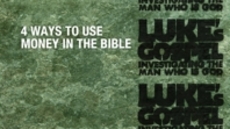
4 Ways To Use Money In The Bible
November 07, 2010

Another Word For Lust
November 07, 2010

Jesus Said The American Dream Is Stupid
November 07, 2010
